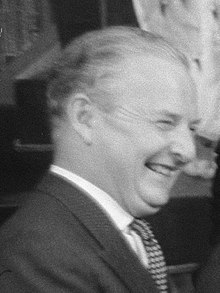
Back سيلوين لويد Arabic جون لويد ARZ Selwyn Lloyd Czech Selwyn Lloyd German Selwyn Lloyd Spanish سلوین لوید Persian Selwyn Lloyd Finnish Selwyn Lloyd French Selwyn Lloyd Latin Selwyn Lloyd Dutch
The Lord Selwyn-Lloyd | |
|---|---|
 Lloyd in 1960 | |
| Speaker of the House of Commons of the United Kingdom | |
| In office 12 January 1971 – 3 February 1976 | |
| Monarch | Elizabeth II |
| Prime Minister | |
| Preceded by | Horace King |
| Succeeded by | George Thomas |
| Shadow Leader of the House of Commons | |
| In office 16 October 1964 – 4 August 1965 | |
| Leader | Sir Alec Douglas-Home |
| Preceded by | Herbert Bowden |
| Succeeded by | Fred Peart |
| Leader of the House of Commons Lord Keeper of the Privy Seal | |
| In office 18 October 1963 – 16 October 1964 | |
| Prime Minister | Sir Alec Douglas-Home |
| Preceded by | Iain Macleod |
| Succeeded by | The Earl of Longford |
| Chancellor of the Exchequer | |
| In office 27 July 1960 – 13 July 1962 | |
| Prime Minister | Harold Macmillan |
| Preceded by | Derick Heathcoat Amory |
| Succeeded by | Reginald Maudling |
| Secretary of State for Foreign Affairs | |
| In office 22 December 1955 – 27 July 1960 | |
| Prime Minister | |
| Preceded by | Harold Macmillan |
| Succeeded by | The Earl of Home |
| Minister of Defence | |
| In office 7 April 1955 – 20 December 1955 | |
| Prime Minister | Anthony Eden |
| Preceded by | Harold Macmillan |
| Succeeded by | Sir Walter Monckton |
| Minister of Supply | |
| In office 18 October 1954 – 7 April 1955 | |
| Prime Minister | Sir Winston Churchill |
| Preceded by | Duncan Sandys |
| Succeeded by | Reginald Maudling |
| Member of the House of Lords Lord Temporal | |
| In office 8 March 1976 – 18 May 1978 Life peerage | |
| Member of Parliament for Wirral | |
| In office 5 July 1945 – 11 March 1976 | |
| Preceded by | Alan Crosland Graham |
| Succeeded by | David Hunt |
| Personal details | |
| Born | John Selwyn Brooke Lloyd 28 July 1904 West Kirby, Cheshire, England |
| Died | 18 May 1978 (aged 73) Preston Crowmarsh, Oxfordshire, England |
| Political party |
|
| Spouse |
Elizabeth Marshall
(m. 1951; div. 1957) |
| Children | 1 |
| Alma mater | |
| Military career | |
| Allegiance | |
| Service/ | |
| Years of service | 1937–1955 |
| Rank | Colonel |
| Unit | Royal Artillery |
| Battles/wars | |
| Awards | Commander of the Order of the British Empire Mentioned in despatches (2x) Territorial Decoration Legion of Merit (Commander) |
John Selwyn Brooke Selwyn-Lloyd, Baron Selwyn-Lloyd, CH, CBE, TD, PC, QC, DL (28 July 1904 – 18 May 1978) was a British politician. Born and raised in Cheshire, he was an active Liberal as a young man in the 1920s. In the following decade, he practised as a barrister and served on Hoylake Urban District Council, by which time he had become a Conservative Party sympathiser. During the Second World War he rose to be Deputy Chief of Staff of Second Army, playing an important role in planning sea transport to the Normandy beachhead and reaching the acting rank of brigadier.
Elected to Parliament in 1945 as a Conservative, he held ministerial office from 1951, eventually rising to be Foreign Secretary under Prime Minister Anthony Eden from April 1955. His tenure coincided with the Suez Crisis, for which he at first attempted to negotiate a peaceful settlement, before reluctantly assisting with Eden's wish to negotiate collusion with France and Israel as a prelude to military action. He continued as Foreign Secretary under the premiership of Harold Macmillan until July 1960, when he was moved to the job of Chancellor of the Exchequer. In this job he set up the NEDC, but became an increasingly unpopular figure because of the contractionary measures which he felt compelled to take, including the "Pay Pause" of July 1961, culminating in the sensational Liberal victory at the Orpington by-election in March 1962. In July 1962 Macmillan sacked him from the Cabinet, making him the highest-profile casualty in the reshuffle known as the "Night of the Long Knives".
He returned to office under Prime Minister Alec Douglas-Home as Leader of the House of Commons (1963–64), and was elected Speaker of the House of Commons from 1971 until his retirement in 1976.
© MMXXIII Rich X Search. We shall prevail. All rights reserved. Rich X Search